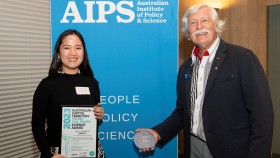The humbling experience of discovering hot, dry noodles
By Meisha-Marika Holloway-Phillips
In August 2017, RSB researchers form the CoE for Translational Photosynthesis Graham Farquhar, Susanne von Caemmerer and Meisha Holloway-Phillips participated as instructors on a 6 days workshop in Wuhan, China, attended by 78 students from all around the country.
China came at both the worst and the best time for me. I’d been feeling pretty flat and had had a busy lead up to the trip, so I didn’t have the usual adventurous spark of expectation. We arrived after midnight in Wuhan after a very early start departing Canberra. The warm muggy air hit us and we immediately took on a dewy glow that remained with us for the rest of the week.
The instructors for the course came from all over the world including technicians from commercial companies. We had gadgets ranging from the leaf-level, whole plant hyperspectral phenotyping all the way to canopy scale eddy covariance. The mornings were spent measuring outside with the students broken into smaller groups that rotated throughout the week. The aim was to gather data on rice and maize grown at two different water availabilities. By the end of each morning we had wilted from the heat and humidity and were relieved to have an afternoon filled with seminars on the theory and applications with practical tips to ensure robust and reliable measurements.
Resources from the Conference are now available online on the CoETP website here, if you’re keen to take a closer look at what was covered.
On the last two days of the course the students assembled the data and put together presentations to discuss their findings. For some of them, this was their first time conversing in English and so was a big moment for them. To finish off the week, we were rewarded with a night cruise down the Yangtze River to see the city lit up. The students took this opportunity to snap proud moments with Susanne and “the real” Graham. As an onlooker it was humbling to realise how important the experience was to them. It’s very easy at ANU to forget how rich we are in role models and mentors.
One student was so overwhelmed by the experience of the week, that when we were saying good bye she said to me that meeting us had given her the confidence and hope that she may one day by the great scientist she wanted to be and had been so touched that as international researchers we’d be interested in investing our time and energy to teach them.
My most favourite discovery was the Wuhan specialty, hot dry noodles. Sesame seeds are a common food so the paste that provides the “dryness” is a bit like tahini. Slather on the chilli oil, tofu and coriander and you have the most amazing comfort food. We all brought some home with us to try and recreate the deliciousness. We ate like royalty, piling our plates high three times a day. Then there were the snacks! Individually wrapped goodies ranging from “oreos” to fish tofu. There is a reason why my bag required some extra sitting on in order to do up the zips! Try the recipe here.
I certainly took more out of the week than a trip to China. The interaction with the other instructors was unique. I’d met most them for the first time earlier in the year at the Gordon Conference in Italy. Whilst conferences are meant to be about sharing ideas, gaining new perspective and forming new collaborations, they sometimes come off as more of a show of who’s dominating the field and so the competitive tone makes the environment counter-productive to forming genuine connections especially if you’re lower down the pecking order. Without those expectations and having the common goal of a successful workshop, it was easy to work together and have a lot of fun along the way. We talked not only about our research but also life and how we were managing job uncertainty. It was refreshing. The students made me appreciate that generosity in science can have a big impact on the outlook of others. Our trip to China was the circuit breaker I needed to regain perspective, and because of that it became perfect timing.







